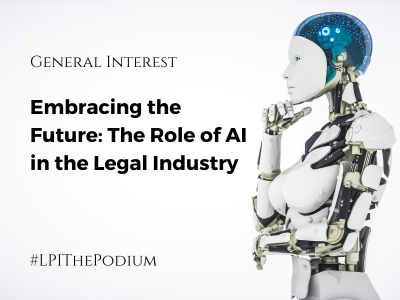
In the ever-evolving landscape of technological advancements, artificial intelligence (AI) has emerged as a transformative force across various sectors. While AI’s potential is widely recognized in fields such as healthcare, finance, and transportation, its impact on the legal industry remains a topic of debate. This article delves into the question of whether AI will find a place in the legal industry, exploring the benefits, challenges, and potential future scenarios.
The Rise of AI in the Legal Landscape:
Traditionally, the legal profession has relied heavily on manual research, document analysis, and repetitive tasks, which can be time-consuming and prone to human error. However, with the advent of AI, legal professionals now have access to powerful tools that can streamline processes, enhance efficiency, and augment their decision-making capabilities.
- Enhanced Legal Research:
AI-powered algorithms can efficiently analyze vast amounts of legal data, including statutes, case law, and legal precedents. This ability to quickly sift through extensive databases saves time for legal professionals, enabling them to focus on higher-level tasks such as strategy and counseling.
- Contract Analysis and Due Diligence:
AI can effectively review and analyze contracts, detecting potential risks, anomalies, and non-compliance issues. This capability is particularly useful in due diligence processes during mergers and acquisitions, where the analysis of numerous complex agreements is time sensitive.
- Predictive Analytics:
By analyzing historical case data, AI algorithms can predict case outcomes and provide insights into legal strategies. This predictive capability can assist lawyers in assessing the strength of their arguments, potentially saving both time and resources.
Challenges and Ethical Considerations:
Despite the numerous advantages AI offers, incorporating it into the legal industry also presents certain challenges and ethical considerations.
- Data Privacy and Confidentiality:
The legal profession deals with sensitive and confidential information. Implementing AI systems must ensure robust data privacy measures to protect client confidentiality and maintain ethical standards.
- Bias and Fairness:
AI algorithms are only as good as the data they are trained on. If the training data contains biases or reflects systemic inequalities, AI systems may perpetuate these biases in legal decision-making. It is essential to address this concern and develop algorithms that are fair and unbiased.
- Human Judgment and the Role of Lawyers:
While AI can streamline processes and offer valuable insights, it cannot replace the nuanced judgment and ethical reasoning of human lawyers. The legal profession requires empathy, creativity, and interpretation, aspects that AI currently struggles to emulate.
The Future of AI in the Legal Industry:
Looking ahead, AI is poised to become an integral part of the legal industry, transforming the way legal services are delivered. Here are some potential future scenarios:
- Legal Research and Due Diligence:
AI will continue to evolve, becoming even more proficient at analyzing legal documents, statutes, and case law. Legal professionals will rely on AI-powered tools to streamline research and due diligence processes, significantly reducing time and effort.
- Chatbots and Virtual Assistants:
AI-powered chatbots and virtual assistants can enhance client communication, providing quick and accurate responses to legal queries, scheduling appointments, and offering basic legal advice. This technology can improve access to legal services, particularly for individuals with limited resources.
- Dispute Resolution and Case Prediction:
AI’s predictive capabilities will improve, enabling more accurate case outcome predictions. This technology can aid in negotiation and settlement processes, potentially resolving disputes more efficiently and cost-effectively.
While AI may not replace human lawyers, it undoubtedly has a place in the legal industry. As AI continues to evolve, legal professionals must embrace this transformative technology to enhance their efficiency, improve access to justice, and deliver better outcomes for their clients. However, careful consideration of ethical implications, bias mitigation, and maintaining the human element of legal practice will be crucial in ensuring that AI is harnessed responsibly within the legal landscape. The integration of AI in the legal industry has the potential to revolutionize the profession, empowering lawyers to focus on complex and strategic matters while redefining the way legal services are delivered.
Note: This article was created with the assistance of ChatGPT. Recent news events have surfaced about the adverse effects of the use of AI in the legal industry.
Categorized in: General
| << previous | next >> |








